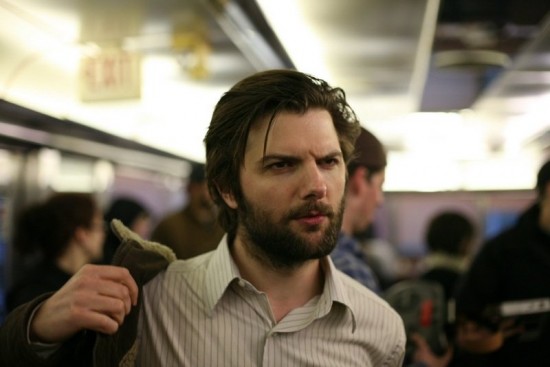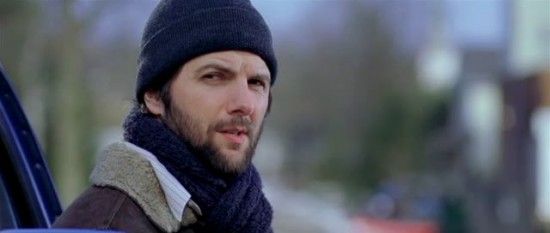
In recent times, Adam Scott has sparkled in pop-culture for two masterful performances as manicured, modern cornholios in the Will Ferrell-endorsed comedies Step Brothers and Eastbound & Down. In the former, his character coached an obnoxious wife and kids in a caravan acapella of "Sweet Child of Mine," while faithfully rocking a Bluetooth headset. In the latter, Scott was a delusional assistant to an assistant of a Major League Baseball team who brags to Kenny Powers that his black AmEx can purchase fellatio from the Jonas Brothers. Ironically, Scott's character proceeds to offer sex—even with "the kids"—to recruit Powers, a karma-deal that snorts the iconic wind from Powers's mulleted sails.
On Party Down, one of the strongest and most left-field cable series to debut last year, Scott has managed to be just as funny and biting as the lead amongst a stellar ensemble cast. His character, Henry Pollard, is an out-of-work actor riding out his prime and the recession as an L.A. caterer, a role flirts fleshed out with drama, depression and romance. But I was still surprised to see Scott's performance in the upcoming indie, The Vicious Kind, which recently earned him an Independent Spirit Awards nom for Best Male Lead. He's in serious company with Jeff Bridges and Colin Firth for playing a construction worked named Caleb Sinclaire. A self-righteous, aimless man with an estranged father (J.K. Simmons) and a misogynistic albeit amusingly bleak worldview, Caleb sinks to new lows in making a hate-play on his innocent brother's weary girlfriend (Brittany Snow).
The Vicious Kind is one more reason why most of the staff at /Film and the /Filmcast is in agreement that Scott should just go ahead and be in any damn movie and TV show ever; with the exception of super hero movies. Scott refreshingly didn't seem too keen to on the genre after our interview was completed. (But for the record: He likes Batman Begins more than The Dark Knight.)

Hunter Stephenson: Is this the first blue collar character you have played? I guess the character you play on Party Down is gradually becoming one…
Adam Scott: Yeah. I mean, I guess it is. Because usually I am these WASPy snobs [laughs] or I have been in the last few years, so it is more blue collar. But I think there's something interesting about the character…
[Adam says to someone, "I'm going to be in here, okay? I'm going to be on the couch and then when I'm finished with this, you can have a quesadilla."]
Adam Scott: Sorry about that, there's a lot going on here. So, my character in The Vicious Kind is blue collar, but he acts almost like he's in an aristocracy, with this high-minded superiority over everyone else. That's one of the funny things about him; and we had him dress in button-up shirts and slacks throughout the entire film even though he works construction. So, I guess he's a snob as well.
And the character also seems to belong to the rise of the anti-hero that has occurred in film over the last decade, with these troubled alpha-male characters, ranging from Daniel Plainview to Kenny Powers. What was it about the last decade that lead to this trend? And what are the redemptive qualities of your character, Caleb, that make him worthy of exploration in a film?
Adam Scott: Well, I think the interesting thing about this character is that everything he says or does is immediately contradicted by something else he says or does. So, as an audience, hopefully, we can see a guy who is flawed and continually realizing his mistakes and screw-ups, and immediately recycling them into something else. I mean, he's completely crazy but I think it becomes apparent after a little while that the misogyny isn't real. It's just a cover for his being a really wounded bird of sorts.
I think the idea of the anti-hero that was so prevalent in the '70s, I do think that it's coming back. Characters like Kenny Powers, like you said; I think people like seeing someone who is flawed. And as far as movies go, I think Pulp Fiction really kicked it off, with the villains being the heroes. So that movie, and Goodfellas at the beginning of the '90s, were incredibly influential. But then cultur


